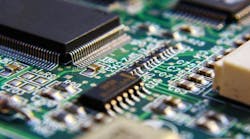Dialog Semiconductor, aiming to reduce its dependence on slumping smartphone sales, rolled out a chip that can be programmed to perform many of the most fundamental analog, power and mixed signal functions in cars. The company said the configurable mixed signal integrated circuit (CMIC) is capable of replacing up to 30 components used in cars, adding to reliability while reducing area and cost.
The SLG46620-A can carry out many of the most common mixed-signal functions in systems ranging from door locks and windshield wipers to advanced driver assistance systems, such as lane-departure warnings and automated parallel parking, according to Dialog. The base die can be programmed to take over the functions of a broad range of AEC-Q100 ICs, including system reset ICs, sensor interfaces, LED controllers and power management ICs (PMICs).
"Automotive electronics designers will benefit greatly from the flexibility and low latency," Tom Sandoval, the company's senior vice president of automotive, said in a statement. Every custom, factory-programmed chip also boosts reliability by reducing the how many potential points of failure there are in the vehicle.The 6.5-mm by 6.4-mm CMIC is the first in a family of products Dialog plans to deliver to the automotive market, Sandoval said.
The chip's speed is also ideal for use in the car's functional safety systems, said Trang Nguyen, automotive marketing manager at Dialog. The chip can quickly process asychronous inputs that flag potentially dangerous events, such as system overheating or component malfunctions. Other inputs could come from cameras, radar or other sensors pointing out potentially unsafe scenarios, like the car straying out of its lane or another car entering its blind spot.
"The ability to detect and react to these inputs allows the system to bring the automobile back into a safe state in a short amount of time," Nguyen told Electronic Design.
Dialog has also targeted its programmable CMICs at the Internet of Things market, which has been its focus since losing Apple as its largest customer for mobile power management ICs—more commonly called PMICs. Apple, which plans to start shipping custom iPhone PMICs in 2019, purchased part of Dialog's core PMIC business last year for $600 million. Despite the deal, Dialog is still supplying another component, the sub-PMIC, for Apple's iPhones.
As part of the deal, Dialog also started supplying Apple with CMICs. The company's CMICs are also an increasingly important part of its plan to reduce its dependence on Apple and double down on chips that can be slapped on everything from thermometers and headphones to factories and cars. Dialog started selling the programmable chips, which on average cost 30 cents each, after its acquisition of Silego Technology for more than $270 million in 2017.
"CMICs are a very important category to Dialog’s future business as it is a fast growing segment and expands Dialog's current addressable market by over $1.4 billion," Nguyen said. More than 3.5 billion CMICs have shipped into smartphones, personal computers and Internet of Things devices since Silego introduced the category half a decade ago. Global sales of Dialog's CMICs surged around 25% last year to more than $100 million.

